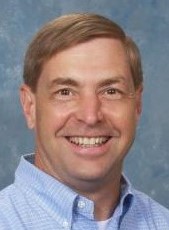The Episcopal Diocese of Central Florida will celebrate the ordination of eight deacons raised up from congregations inside and outside of the diocese on Saturday, Sept. 8, at The Cathedral Church of Saint Luke in Orlando. To commemorate this achievement, the ordinands joined us for a Q&A about their religious background, leadership roles, how the call to become a deacon transpired, and what their goals are for their respective ministries.
Part 3: Meet Raleigh Langley, Caroline Miller
Raleigh Langley
Current church/capacity: I have been the full-time minister with youth at St. Francis in the Fields Episcopal Church in Harrod’s Creek, Kentucky, for 28 years. Sponsoring parish: church of the Messiah, Winter Garden.
Deacon title: Transitional Diaconate.
Please briefly summarize your religious background as far as your upbringing and any leadership roles you may have held.
I grew up attending Kilgore Baptist Church in Columbia, South Carolina. When I was 16, I became a Bible study leader and the Sunday sexton of the church. I continued to serve this Church throughout college and my role expanded to helping with youth. I became a summer counselor, an age-group director and later a program director at Ridgecrest Camp for Boys in Ridgecrest, North Carolina, where I worked for 10 summers. I also worked as a leader at a Centrifuge Camp in Mississippi for one summer. I attended and graduated from the Southern Baptist Theological Seminary in Louisville, Kentucky, with a Master of Divinity degree in 1990. I was also ordained as Baptist minister. I have been employed and continue to serve as the minister with youth at St. Francis since the fall of 1990. When I was hired, the rector, Robin Jennings, told me he was looking for someone to love our youth and teach them the Bible and I knew that was my calling.
How did the call to become a deacon transpire for you?
I felt the call to enter the ordination process in the Episcopal Church as I served our parish and realized I was called to enter into a deeper relationship with our church family.
How do you hope to help the Episcopal Church as a deacon?
I am excited to be able to assist with worship and continue to serve our youth and families. In this role, I will continue our missions with the David School in the Appalachian Mountains and the Dominican Evangelical Church in San Cristobal, San Rafael and Samongola.
Caroline Miller
Current church/capacity: Recently accepted a call to serve at Grace Episcopal Church, Ocala. Will serve as transitional deacon at Grace and remain on staff after priesthood ordination. Sponsoring parish: St. Peter’s, Lake Mary.
Deacon title: Transitional Diaconate.
Please briefly summarize your religious background as far as your upbringing and any leadership roles you may have held.
When I was growing up, my parents served as missionaries in Nairobi, Kenya. Needless to say, my relationship with Jesus has been a big part of my life as long as I can remember! Over the years, God has led me into a variety of roles in the church and in ministry, both formally and informally. For example, in addition to working in the diocesan office, I served as a lay Eucharistic minister and young adult group leader for several years before discerning the call to the priesthood.
How did the call to become a deacon transpire for you?
All Christians are called to service. It is part of our DNA as the Body of Christ. Everyone called to ordained ministry is called to be a deacon; that type of focused, intentional, and loving service is the very foundation of Christian leadership. When I discerned my call to the priesthood with the help of my church community, my mentors, and my friends, I knew that it meant I was called to be ordained as a deacon first.
How do you hope to help the Episcopal Church as a deacon?
The primary role of a deacon is to serve as a bridge between the Church and the world, bringing the needs of the world into the Church and helping the Church step out in faith and love into the world with the Gospel. Deacons are especially called to love and serve the poor, the weak, and the desolate – the types of people society overlooks. As a counselor, I hope that I can fulfill my diaconal call not only by serving the poor and the “least of these” as we classically think of them (which I think is absolutely essential!), but also by serving the lonely, the isolated, and the emotionally and relationally impoverished.


